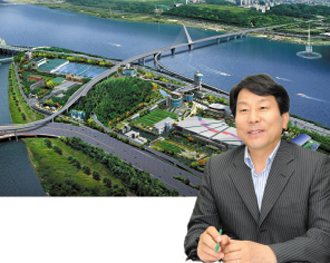A Look into the Past, Present and Future of Arisu
The Office of Waterworks offers three Arisu experience tour courses
 The Office of Waterworks of the Seoul Metropolitan Government (SMG) has explored three tour courses in which Korean and foreign tourists can get a glimpse of the development of Seoul¡¯s tap water, dubbed Arisu, as well as enjoy neighborhood tourist attractions.
The Office of Waterworks of the Seoul Metropolitan Government (SMG) has explored three tour courses in which Korean and foreign tourists can get a glimpse of the development of Seoul¡¯s tap water, dubbed Arisu, as well as enjoy neighborhood tourist attractions.
The number of Korean and foreign visitors to the Seoul Waterworks Museum and Ttukdo Arisu Purification Center has grown to roughly 70,000 in 2009, and the Office of Waterworks is providing an opportunity for children to experience Arisu through a tour and get a better understanding of the city¡¯s tap water.
The Office of Waterworks has developed three Arisu experience tour courses covering the Seoul Waterworks Museum and Ttukdo Arisu Purification Center by upgrading the simple observational tour programs.
The first tour course takes tourists to the Seoul Waterworks Museum, Arisu Purification Center at Ttukdo Tap Water Station and Seoul Forest. Visitors are given the chance to see the Ttudo Tap Water Station that made its debut as the nation¡¯s first waterworks station 102 years ago, appreciate the importance of water at the in-house Seoul Waterworks Museum, designated as Cultural Property No. 72, and experience a variety of exciting programs, including natural soap making. For tourists, an observation of the state-of-the-art process of producing Arisu is an enlightening experience, while a stroll through Seoul Forest with its changing landscape according to season with a plethora of flowers and trees is enchanting, and, in particular, they can command a panoramic view of the Han River from the hill over the forest.
The second tour course takes tourists to the Ttukdo Arisu Purification Center and Gui Water Purification Station. Visitors can take a look at a chronicle of the developments of tap water systems in Gwangjin Ward, eastern Seoul, and visit the first and second facilities of the Gui Water Purification Center, designated as cultural properties, and the newly opened Water PR Complex in Grand Children¡¯s Park in Neung-dong. The course provides diverse experiences all family members can enjoy together.
The third tour course takes tourists to the Yeongdeungpo high-tech water treatment center and the Seoseoul Lake Park. The environmentally friendly, high-tech water treatment center and Seoseoul Lake Park emerge as neighborhood places reminiscent of the past. The park, once the old Shinwol Water Purification Station, offers a fresh setting harmonizing tap water sculptures with the surrounding landscape.
Lee Jeong-kwan, assistant mayor of the Office of Waterworks, said his office plans to develop the tour courses into tourist attractions not only offering differentiated experiences to see, enjoy and learn, but also providing memorable tales via expert narrators.
LATEST TEST SHOWS QUALITY AND SAFETY OF ARISU ¡ª Arisu has been reconfirmed as quality tap water as all tap water at the ward civil affairs offices and restaurants has passed a quality test.
An official at the Office of Waterworks said a test of Arisu being served at 25 ward offices and restaurants was conducted for about one month between Sept. 7 and Oct. 4 in 155 survey categories, recommended by the World Health Organization (WHO), and the outcomes of the latest tests confirmed Arisu as a world-class quality water.
Currently, bottled Arisu is a fixture at government meetings and international conferences. Some Seoulites still have misgivings over the quality of Seoul¡¯s tap water, so the latest tests were carried out by the Seoul Metropolitan Waterworks Research Institute, designed as a certification institution of ISO (International Organization for Standardization) /IEC (International Electrotechnical Commission) 17025, so as to recognize Arisu¡¯s safety and excellence through scientific data.
Among the testing survey categories were 15 kinds of microorganisms, including colon bacillus; 21 kinds of harmful minerals, including mercury; 70 organic materials, including phenol and benzene; 26 kinds of residuals from chlorination; and 23 kinds of substances, including calcium and magnesium.
The latest testing showed that the turbidity of Arisu ranged from 0.04 NTU to 0.15 NTU, below the limit of 0.5 NTU, while calcium and magnesium were measured at between 8.3 to 16.2 mg/L and between 1.8 and 3.0 mg/L, respectively. The residuals from chlorination showed figures below the permissible limit, and such harmful substances as agricultural chemicals, heavy metals and salmonella bacteria were undetected, proving that Arisu is healthy for human consumption and a fresh, quality tap water. nw
Lee Jeong-kwan, assistant mayor for the Office of Waterworks of the Seoul Metropolitan Government
3Fl, 292-47, Shindang 6-dong, Chung-gu, Seoul, Korea 100-456
Tel : 82-2-2235-6114 / Fax : 82-2-2235-0799